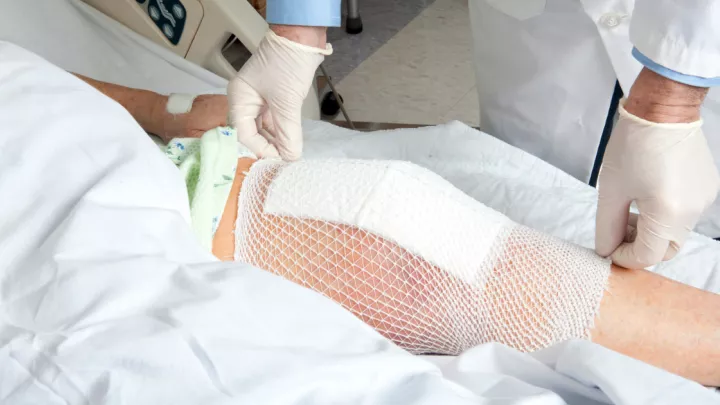Questions to ask your doctor before a knee replacement

Cartilage – the tissue that covers the end of your bones where they connect at a joint – allows your bones to glide over each other smoothly. Unfortunately, this cartilage can wear away through injury, osteoarthritis or overuse, resulting in friction and pain in a joint.
One of the most common locations for cartilage loss is the knees. That’s why, according to the American Academy of Orthopaedic Surgeons, doctors complete more than 700,000 total knee replacements annually in the U.S. But if you have knee pain and are considering a knee replacement, there are several questions you should ask your provider before undergoing the procedure.
When is a knee replacement appropriate?
The first question to ask your health care provider is when a total knee replacement is appropriate. “I tell patients they need to have an advanced degree of osteoarthritis seen on X-rays in the knee,” says orthopaedic surgeon Christopher Deans, MD. “Once there’s confirmed osteoarthritis in the knee, the most important question becomes, how much is it limiting your daily life and the activities you enjoy?”
This limitation could present itself in normal daily activities like going up and down stairs, playing with your kids or grandkids or disrupting sleep. Or, your knee could be limiting you during more intensive activities you enjoy, like biking, swimming or playing pickleball. “Regardless of how it's presenting, once you have arthritis and knee pain is limiting your daily life, the question becomes what options do you have that will allow you to maintain your activities before resorting to a total knee replacement,” says Dr. Deans.
Treatment options before a knee replacement?
Treatment options for patients with knee pain who haven't yet settled on a total knee replacement include:
- Medicines like acetaminophen or other anti-inflammatory drugs or supplements.
- Modifying daily activities.
- Managing weight or weight loss.
- Physical therapy.
- Injections – such as corticosteroids, hyaluronic acid or other alternatives.
- Nerve blocks around the knee.
“When these methods fail and you’re tired of doing all the nonoperative therapies – or your function continues to decrease – that’s when we have a serious conversation about doing a knee replacement,” says Dr. Deans.
What should you do before a knee replacement surgery?
Once your provider and you decide it's time for a knee replacement, it's vital to protect the new replacement by ensuring you're as healthy as possible before surgery. "That means we're going to control all of your risk factors going into surgery, so you are as healthy as you can be for the best knee replacement it can be," says Dr. Deans.
First, if you're taking prescription pain medications – not acetaminophen or anti-inflammatories – but opioids, you'll need to wean off of them entirely before surgery. "Eliminating opioid use makes the postoperative pain control and overall function better," says Dr. Deans.
Second, you want to focus on your nutrition. “If you’re overweight, it’s a benefit to you if you can cut some weight before surgery,” says Dr. Deans. “Still, you need to reduce weight safely, which means ensuring you’re still feeding your body properly and getting good nutrients, especially protein and healthy fats.” Even if you're not overweight, you need plenty of protein and other key nutrients before surgery to ensure you're as nutritionally sound as possible.
Third, you'll need to retain as much strength and range of motion in your knee as possible. "It's always the worst – in terms of pain – right before the knee replacement because we're trying to keep the knee moving and strong while it is worn out," says Dr. Deans. But this exercise is essential to ensuring your knee is ready for a replacement. "Walking daily or going to the gym for low-impact exercises like swimming or stationary biking are excellent ways to retain strength in your knee, making it easier to get your strength back quickly after surgery," says Dr. Deans.
The final pre-surgery factor is sleep because surgery often disrupts sleep for a period. "For some, this disruption is short-term," says Dr. Deans. "But for others, it's longer and can last several weeks." Postoperative pain medicines, pain or the physiological stress of surgery can obstruct your sleep after a knee replacement surgery. "So, one of the best things you can do before surgery is to get on a stable sleep schedule to ensure your body is ready to restore and heal itself," says Dr. Deans.
What can you expect on the day of surgery?
If you go to a Nebraska Medicine provider, they will discuss expectations surrounding your procedure. For example, they'll cover whether it's appropriate for you to stay overnight to keep a closer eye on you after surgery or whether you can go home immediately after the procedure.
“Regardless of which option we recommend, it needs to be safe," says Dr. Deans. “If it's safe, we prefer that you go home after surgery. If you have good support at home, we like people to return because patients recover better when they are back in their home environment, their own bed, and with their own family around them.”
You and your provider will make this decision before surgery. On the day of, you'll show up at the hospital usually 1.5 to two hours before the time of your procedure. "Our preoperative nurses will provide you some education about the surgery, and then you'll take a few medications to help with postoperative pain," says Dr. Deans. "Then our anesthesiologist provider will visit with you to determine which anesthesia decisions are appropriate for you. Finally, the surgeon will visit with you one final time.
If you’re staying in the hospital overnight, you’ll recover briefly in the postoperative care unit, for a short period to ensure you’re eating, drinking, and able to urinate. “We'll also begin physical therapy and work on adequate pain control," says Dr. Deans.
The routine is largely the same if you go home the same day. Except after recovering in the postoperative care unit, you'll work with a physical therapist to ensure your pain is controlled and you can get around adequately, including climbing some stairs to ensure you'll be safe at home. "We also call the patient the next day to make sure their night went well and answer any remaining questions you have. When patients go home on the same day, we ensure home physical therapy is arranged within the first few days after surgery," says Dr. Deans.
Ultimately, deciding to stay in the hospital or return home following surgery is a shared decision. If you don't feel comfortable going home, you'll stay overnight. "Going home requires having somebody there who's capable of supporting you," says Dr. Deans.
What are the primary risks or complications of total knee replacement surgery?
“The main complication of modern total knee replacement surgery is infection," says Dr. Deans. Infection is the most common cause of needing to redo a knee replacement in the modern era." Still, this risk is very low because of the pre- and postoperative infection prevention techniques providers use today.
“A second possible complication is stiffness," says Dr. Deans. "When counseling patients on stiffness and their function, I tell them it's a 50/50 partnership." Ultimately, your health care team can do the best job possible on your knee replacement, but unless you put in the other 50% of the effort with physical therapy, the knee will get stiff and not be as good as you want it to be.
“Finally, over the long term – 20 to 25 years – these implants will wear out, just like a regular joint will eventually wear out," says Dr. Deans. So, I advise patients on the activities they can expect to do after surgery and how they can keep the new knee as long as possible.”
Getting a total knee replacement with Nebraska Medicine
According to Dr. Deans, you should never let anyone talk you into a total knee replacement surgery. You should make this decision only after you have all the information and thoroughly discuss it with your health care provider. Because while you can always get a replacement in the future, you can never take it back.
“In our modern health care system, you can always get multiple opinions,” says Dr. Deans. “If any patient with knee pain has concern over the diagnosis they’ve received, we’re always happy to see them here and provide another opinion and recommendation.”
Although total knee replacement surgery has a tough recovery process, you should eventually end up with a knee you don't even think about. Similarly, while a knee replacement can get you back to doing the things important to you – like playing with grandchildren or riding a bike – no matter how good it is, it will never exactly match your bone and cartilage.
Still, if your knee function is limited and you’re ready to get back to doing the things you love, a total knee replacement surgery may be right for you.







